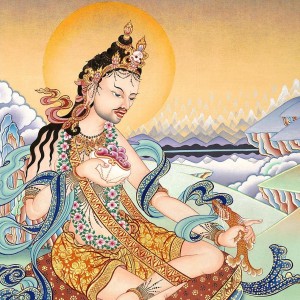
Meditation – Lhag Thong
Its name is Sahaswara and it has a thousand petals.
The way to it has been written about but is almost certainly misunderstood.
Here is a quotation. “The attainment of transcendent insight is the real object of the training advocated in the traditional Tibetan Oral Teachings, which do not consist, as so many imagine, in teaching certain things to the pupil, in revealing to him certain secrets, but rather in showing him the means to learn them and discover them for himself.
The Masters of the secret teachings say that the truth learned from another is of no value, and that the only truth which is living and effective, which is of value, is the truth which we ourselves discover.
If this were not the case, it would be enough for us to read the innumerable works in which philosopher’s, savants and doctors of the different religions have explained their views and to choose from among them one which agrees with our own ideas and to which we can cleave. This is what is done by most of these individuals whom the Tibetans classify in the intermediate category of the average-minded.
This stage should be surmounted. It is not enough to see with eyes which, according to the words used in Buddhist Texts, “are only covered with a thin film of dust”, however thin this film may be; it is a question of removing the last trace of dust which interferes with sight.
Literally, lhag thong, means to see “more”, to see “beyond”, to see “extremely”, “supremely”. Thus, not only to see more than that which is seen by the mass of mankind who are crassly ignorant, but to see beyond the bounds limiting the vision of cultivated minds, to bring into being the third eye of Knowledge which the adepts of tantric sects place in the centre of the forehead of their symbolic Gods.
An illustration of this last statement is that the very first suggestion they give to the student is to DOUBT! It is only through doubt that one will come to analyse truly and understand those things their attention is directed to. Following this they are given this advice, spoken by the Buddha. “Do not believe on the strength of traditions even if they have been held in honour for many generations and in many places; do not believe anything because many people speak of it; do not believe on the strength of sages of old times; do not believe that which you have yourself imagined, thinking that a god has inspired you. Believe nothing that depends only on the authority of your masters or of priests. After investigation, believe that which you have yourselves tested and found reasonable, and which is for your good, and that of others.”
The non-activity they mean is ‘that of the disordered activity of the mind which unceasingly devotes itself to the work of the builder erecting ideas, creating an imaginary world in which it shuts itself like a chrysalis in a cocoon’. This is very reminiscent of Jung’s suggestion to patients that they allow fantasies to arise in the mind, and then to watch these fantasies, attempting to see their cause, and the underlying forces at work. It is an attempt to step back from our convictions, ideals and morals; to set them loose, and watch them as a silent watcher, who does not interfere, condemn, or condone.
Masters of the secret oral teachings point out that this Short Path is one that many prefer not to take. The guiding forces of morality and social rights have been removed, and the student may fall into one of the pits of extremity that he was previously fenced from. “It may indeed be foolish to preach to an individual of ordinary mind that there is neither Good nor Evil; that his acts have no importance, and that, moreover, he is not the author of them, because he is moved by causes whose miscellaneous origins are lost in the inscrutable night of eternity.”
True, it may be foolish for the multitude. But for some, these ideas come as a delightful shock of confirmation to intuitions half formed and half sensed within themselves. To some of these latter, if they persist, may come Lhang Tong-Transcendent Insight. As the Masters say, the student may persist for years with no result, and then suddenly, one day, while looking at a stone, or feeling the wind upon his face, he is possessed by Lhang Tong, and from all the ties and chains he has found RELEASE.
